Looking forward
Foundations for the future

Students using virtual reality to explore complex biological concepts. Images courtesy of Shrewsbury School.

Leo Winkley (Shrewsbury School) harnesses the strength of tradition.
Those who work in schools drink from the fountain of perpetual youth. We live with the future. The fashions, the argot, the hairstyles, these all change; but, year on year, we surround ourselves with the same essential segment of human life: the young. Surely, we educators benefit from an ambient Peter Pan effect. It is the young that keep us young, isn’t it? And yet, we date. We date.
It would be a strange school leader that didn’t spend time thinking about the future. In education, it is our job to predict what the future might demand of these children in our care. In this sense, education is a feat of the imagination. It is story telling.
The main subject of our story telling is the teenager. This is a stage in life that is defined by paradoxes. The teenager craves to be treated as an individual, yet to belong to the group. She wants to be noticed; she wants to blend in. He wants to take risks; he wants to feel secure. She wants to set sail; she wants to weigh anchor. These internal tensions are plenty to manage. This is familiar territory.
It is an article of faith for me that the values and virtues that guide education are enduring torchlights that burn for a lifetime. In times that are chaotically uncertain, the accumulated, orderly wisdom that great schools offer is of essential value. The more virtual and digital that life becomes, the greater the need for the anchorage of place, the more compelling the identity of real community. Our strengths are the certainties that we can offer. The safe harbours of deeply held values, traditions and habits that promote identity and belonging. The wisdom of the ages.
That said, we cannot be museums. The radical futurist will command us to “modernise or die”. We must be willing to challenge the inherent Victorian model of education that still defines so much of our work. We need to shift our paradigms.
Some say that schools like ours will gradually be squeezed out of existence. Certainly, we face an urgent challenge to be relevant. We need to offer an education that is of exceptional value. This entails increasingly individualised learning; game-changing employability skills; access to mentors, networks and global opportunities.
Let’s face it: parents who select independent education are choosing acceleration. (I deliberately avoid the word advantage). We need to share that acceleration more widely. We need to be engines of social justice rather than privilege. We need to be collaborative organisations whose partnership work shares opportunities and extends the acceleration that we are offering.
Technology is, of course, the newest element to our blend. This will democratise and radically transform education. Machines will take over many activities. But, the intricate workings of the human mind – what motivates, what guides us – these things are irreducibly human. Virtualisation will never replace the need for real people and real places of learning. The more abstract and diffuse our experiences, the greater the acceleration of digitalisation, the more we will crave the ancient fireside warmth of living and learning alongside real presences. Our story telling needs to be agile and tailored to a fast-moving world. Even more meaningfully, though, it needs to promote the value of place; of human uniqueness; and of deep learning.

Engaging with science in the classroom.

DT students taking projects from concept to construction.